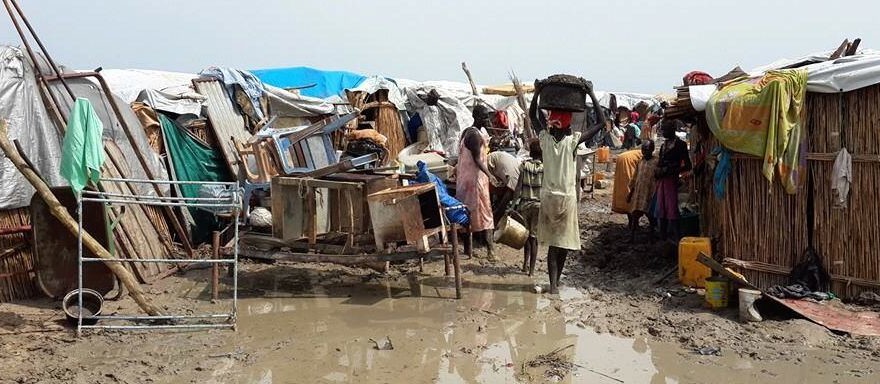Fear and hunger continue to drive people to UN-protected sites in South Sudan, with the population of these sites now reported to be about 100,000. This has prompted the UN to expand protection sites to accommodate new arrivals and decongest existing camps.
Thousands of people began arriving at the gates of UN bases in Juba starting on 16 December, after being targeted by soldiers. Since then the violence spread to other states as well where civilians likewise sought UN protection.
Most of the UN-protected people are ethnically Nuer, South Sudan’s second largest ethnic group, which inhabits territories in the conflict-affected states of Unity, Jonglei and Upper Nile, as well as some neighborhoods of the national capital Juba.
The UN Mission in South Sudan (UNMISS) this week provided conflicting figures as to the number of displaced taking shelter at ten of its bases around the country, but overall set the number somewhere around 100,000 people or more.
This represents an increase of approximately 9,000 to 10,000 since late May, when the number stood at about 91,000.
Derk Segaar, chief of a UNMISS department called ‘Recovery, Reintegration and Peacebuilding,’ said that as of 19 June the mission was providing shelter for about 95,000 people, “the largest figure since the beginning of the crisis.”
But he added, “It could well be over 100,000 as we see a continued influx at our base in Bentiu,” adding that verifications of numbers were ongoing as people continued to arrive at the base, many in malnourished condition.
The UNMISS information office on Wednesday stated in a written update, “As of 18 June, the estimated number of civilians seeking safety in ten Protection of Civilians (PoC) sites located on UNMISS bases is 101,483.”
In the same update, however, a chart showing a data breakdown by site added to only 94,338. It was therefore unclear how the mission arrived at the figure of 101,483.
The chart stated that there are 31,940 people at the UN-protected sites in Juba (Tomping and UN House), 18,003 in Malakal, 4,100 in Bor, 38,800 in Bentiu, 555 in Wau, 984 in Melut, 27 in Nasser, and 29 in Rumbek.
Segaar, the senior UNMISS official, announced on Thursday that the mission is making progress to extend camp sites as well as create new protection sites to relieve overcrowding.
A new protection site beside the UNMISS headquarters in Juba has been opened to relocate people from the Tongping camp, a protection site that the mission’s leadership has chosen to close down in part because it is located in a flood-prone area.
The new site in Juba has capacity to shelter up to 13,300 people, according to Segaar, who added, “Relocation from the UNMISS Tomping base to the new site is beginning this week.”
The UNMISS base in the Upper Nile State capital Malakal has also been expanded, and some 7,000 displaced have moved from the old Malakal site to the new one.
Segaar noted, however, that the camps are “only temporary solutions to avoid a health crisis during the rainy season. In the longer term, we hope a political solution and the stabilization of the security situation will create the conditions in which the IDPs [displaced] will feel safe to go home.”
Danger within the camps
Meanwhile, an aid organization working with women within the camps has warned that many in the camps face grave threats of sexual violence.
In a blog post on Thursday, CARE International Country Director Aimee Ansari said that there were 64 reported cases of gender-based violence within a one week period at one of the UN-protected camps.
She did not specify at which base the attacks occurred. She said, “I can’t fathom 64 cases in an area that women have fled to be ‘protected.’”
Also she noted that recent research by her organization found that only 57 percent of women tell others about a violation. “As a result, no one really knows the true scale of the issues. So, if there were 64 reported cases in that one area, we could expect that 130 women faced some form of violence last week,” she wrote.
Ansari suggested that the UN peacekeepers should take some additional measures to protect women from violence within the camps: “Simple things like placing adequate lighting around latrines, so that women aren’t raped at night would go a long way.”
“Or doing foot patrols with civilians who are women and who speak the local language would help the peacekeepers to better understand issues and communicate to people how they can help protect them,” she stated.
Related:
Population at UN ‘protection sites’ surges past 90,000 (29 May)
MSF slams UN leadership in South Sudan for ‘shocking indifference’ (9 Apr.)
Courtesy photo via Human Rights Watch: Flooding affected the UNMISS Protection of Civilians Site in Bentiu, Unity State, June 2014




